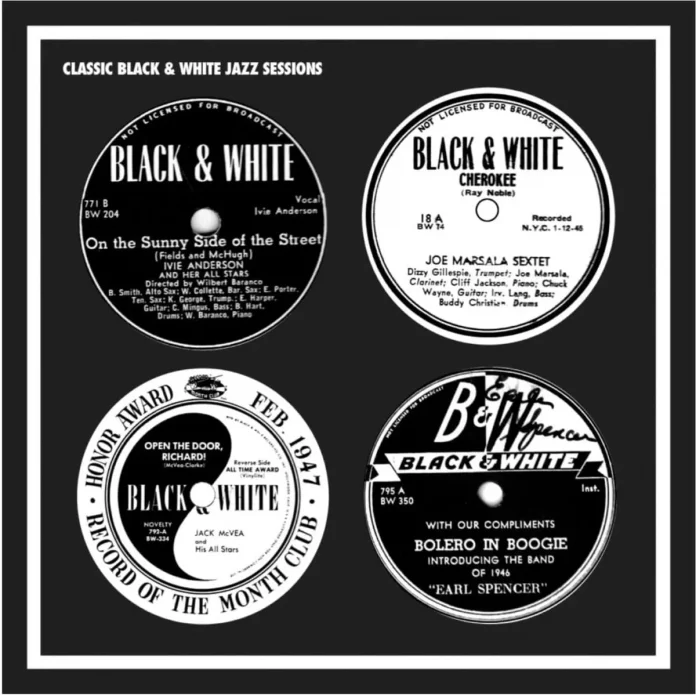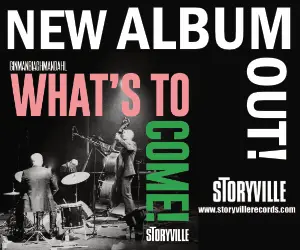The Black And White label could hardly have been conceived at a less auspicious time – in 1943, in the middle of a world war. The three majors, Columbia Decca and RCA, took most of the shellac. Smaller companies were usually limited to pressing 100 copies of any disc.
This 11-CD set has extracted the jazz cream of the catalogue. It’s made up from what in the old days, we used to call “middle period jazz”.
Art Hodes, Cliff Jackson, Gene Schroeder and Dick Cary feature on the earliest recordings. The seven unaccompanied Hodes tracks are gorgeous. Cliff Jackson’s band features his best mates Sidney De Paris and Sidney Bechet. Why was the De Paris’s growl trumpet work not more treasured? He lets fly with the mute on Quiet Please, and his open work elsewhere is tasteful and precise. Bechet is as ever eloquent on clarinet and soprano. Jackson’s quartet has Pee Wee Russell flying during what was probably his best period. Pee Wee graces Squeeze Me with a wonderful compote of stringent melancholy. Jackson plays robustly throughout and we can lift him several places in the list of stride players. This corner of the album is an Encyclopedia Britannica of stride!
After Pee Wee’s raucous complaints we are visited by another jazz invalid, Mezz Mezzrow, for Wettling’s trio. I have great affection for Mezz and wonder how he managed to impose himself on so many great sessions by his betters? Wettling tries to kill him off and when Schroeder starts to solo the whole business lifts instantly. This is only a prelude to the magnificent Lion and his Cubs. Their cage includes Max Kaminsky, Jack Lesberg and the very welcome Rod Cless. More Rod Cless with four tracks beginning with Froggie Moore that have Sterling Bose on trumpet and sparkling piano from James P Johnson. Mike Lo Scalzo is a pianist who ranks with Schroeder and has the taste to include Brad Gowans and his inter-denominational valide as well as dazzling guitarist Chuck Wayne. Brad is excellent on Tin Roof Blues and yet another fine New Orleans clarinettist, Leonard Centobie, is also convincing here.
I’m sure Lil Armstrong never employed the racial epithet laid upon her. She was an accomplished musician and her bands were always good. She has the first of the plethora of “boogie” titles which confirms the piano style to have been the fad of the day when Black And White was born. A rampant Higginbothan and Jonah Jones blow that they don’t give a damn on this session. Jonah’s name has been mistakenly omitted from the date by the unexceptional Mushmouth Robinson, with Higgy and Lil both ascendant.
The handful of female singers is naturally topped by Ivie Anderson, who sings non-ducal songs for once. Nice trumpet here from Karl George and bass from young Mingus. The first dozen tracks on CD5 happily confirm that Bigard hadn’t yet begun to go off after leaving Duke! Fleet and agile, he’s chosen the beautifully delicate trumpeter Joe Thomas as his lead partner throughout.
Jack McVea impressed on the early JATP tracks, and it’s satisfying to have a whole CD (CD6) devoted to his work. He had a nice trumpeter (Jack Perdue) and pianist Jimmy Shackleton. Alas, the boogie really takes hold on these 12 tracks. McVea’s warm tenor is everywhere and Open The Door Richard is the sensational original that made him rich when, from out of nowhere, it swept across the world. It’s a classic of Gaillard humour and for a hit record it’s good jazz. My Business Is COD has a clarinet solo that sounds too good to be Marshal Royal. Could it be by McVea?
Chuck Wayne makes another outstanding appearance on Joe Marsala’s session. Joe is happy to use the clarinet as a foil for more graceful Joe Thomas trumpet and Adele Girard (his wife) adds exotic and effective harp. The results use the John Kirby/Goodman Sextet formula to good effect. Joe favoured the lower registers but here he soars upwards without restraint. In the myriad of girl singers Linda Keene stands out on two blues tracks with Joe. (She sings on an earlier session here with Charlie Shavers). A fully formed (explosive bop) Dizzy Gillespie appears alongside Chuck Wayne and Cliff Jackson on the final four tracks by Joe. Cliff, unbowed, manages some more stride, but Dizzy’s transformation of Alamo is breathtaking. Overall Joe’s ten tracks present an impressive picture of the clarinettist.
Real bebop emerges formally on the Howard McGhee tracks. Howard was a more important signifier of the new music than his reputation suggests. I had a splendid interview with him and loved his music. He reciprocated by wanting to make off with my wife. Howard features here again in the Wilbert Baranco Big Band, one of a trio of great big bands that appear at this point. The others are led by Gerald Wilson and the remarkable trombonist Earle Spencer, who led a big band until he was 23, when he gave up playing in 1949 due to a heart murmur. In 1973 he was killed by a car, whilst walking along a road at night.
Erroll Garner’s trio makes an early appearance, as does Charlie Ventura’s pre-bop sextet with Willie Smith, Red Rodney and Barney Kessel. Erroll indulges the boogie fad with Twistin’ The Cat’s Tail. Ventura sailed the mainstream seas before turning to bop, and his playing here is full of authority, amongst some of his best on record.
“Supervised by Leonard Feather” too often led to him imposing himself as pianist. It does so a few times on this set, including for the session of half a dozen tracks by a Feather-reconstituted Spirits of Rhythm, a decade after the original which doesn’t retrieve the elfin attraction of the original.
But let’s not conclude on a sour note, for this is one of the best large collections of jazz to appear for some time. The quality of the music is so high that one wonders how it could have lived in obscurity for so many decades. It will be a wonderful acquisition for any collection.
Discography
CD1: (1) Snowy Morning Blues; Four Or Five Times; She Went And Did Her Dance; Sad And Blue; Dear Old Southland; Art’s Boogie; St Louis Blues; (2) Quiet Please; Squeeze Me; One Hour; Weary Blues; (3) Royal Garden Blues; It Had To Be You; Limehouse Blues; Who; (4) You’ve Got Me Walkin’ And Talkin’; Quiet Please; Cliff’s Boogie Blues; Jeepers Creepers; (5) Maple Leaf Rag; Upbeat; Changes Always On My Mind; I Give You My Word (71.42)
CD2: (6) Some Of These Days; Everybody Loves My Baby; China Boy; That’s A Plenty; (7) I Thought About You; You Took Advantage Of Me; (8) Liza; I Ain’t Got Nobody; Sweet Georgia Brown; Tea For Two; (9) Let’s Mop It; Muskrat Ramble; Bugle Call Rag; How Could You Put Me Down?; (10) Froggie Moore; Pallet On The Floor; I Know That You Know; Have You Ever Felt That Way?; (11) Stokin’ The Boogie; Blues For Clarence Profit; Preachin’ Blues; The Little Goose (63.56)
CD3: (12) Jazz Band Ball; Tin Roof Blues; Indiana; Royal Garden Blues; Sister Kate; That’s A Plenty; Someday Sweetheart; Muskrat Ramble; (13) East Town Boogie; Little Daddy Blues; Lady Be Good; Confessin’ (14) Let’s Get Some; Boogie Boo Blues; I’m Hip To These Women; I Got The Blues; (15) Boogie Woogie Lou; Out Of This World; My Little Girl; Your Wig Is Gone (71.40)
CD4: (16) Be-Baba-Le-Ba; Rhythm In A Riff; I Changed The Lock On The Door; Don’t Drive This Jive Away; (17) I Got It Bad; Sunny Side Of The Street; I Thought You Ought To Know; The Voot Is Here To Stay; Tall, Dark And Handsome; Butter And Egg Man; Twice Too Many; Empty Bed Blues; (18) Be-Baba-Le-Ba Boogie; Married Man Blues; Bebop Bounce (71.40)
CD5: (19) Salty Papa Blues; Evil Gal Blues; Blow Top Blues; Long, Long Journey; (20) Blues Before Dawn; Poon-Tang; Nine O’Clock Beer; How Long Blues; (21) Can’t Help Lovin’ That Man; Please Don’t Talk About Me; Sweet Marijuana Brown; Blues For Art’s Sake; (21) Gee Baby, Ain’t I Good To You?; Ghost Of A Chance; Blues On My Weary Mind; I Must Have That Man; (22) Goody Goody Baby; Give It Up; Private Stock; Root Of All My Evil; MT Boogie; Cold Blooded; Loving Course Blues; I Want Somebody; Drummer Man Blues (76.04)
CD6: (23) Bartender Boogie; Play It Over; House Party Boogie; My Business Is COD; Baby Make Up Your Mind; Jack’s Boogie; F Minor Boogie; Jam Boogie; Frantic Boogie; Blugin’ Eyes; Open The Door, Richard; The Crow’s Boogie; Basses Boogie; Boilermaker’s Boogie; Blackout Boogie; Hangover; Baby, It’s Fun; Reetie Vootie Boogie; Groovin’ Boogie; Barrel House Boogie; Darlin’ It’s Just Like A Dream; Butch; Groove Juice; Two Timin’ Baby (68.34)
CD7: (24) Romance; Zero Hour; Joe-Joe Jump; Unlucky Woman; Blues In The Storm; Don’t Let It End; Perdido; Melancholy Baby; On The Alamo; Cherokee; (25) 100 Years From Today; Blues In Nat’s Flat; If I Had You; These Foolish Things; (25) White House Bounce; Twistin’ The Cat’s Tail; Movin’ Around; Night And Day (77.04)
CD8; (28) Eh Baby; You Talk Holes In My Clothes; Don’t Like ’Em; Dead Man’s Blues; Sweet Eileen; Don’t Worry ’Bout Strangers; I Know A Man; I Feel So Smoochie; (29) Red Light; By The River Ste Marie; Be Happy Pappy; Red Boogie; (30) Boogie In My Flat; The Killer’s Boogie; (31) Hot Rock; Sometimes I’m Happy; Got An Ache In My Heart; Baby, Look At You; Blues In C Sharp Minor; Lil’ Victor’s Boogie; Blues Rhapsody; Rosetta; Memories Of You (69.30)
CD9: (33) Honeysuckle Rose; Scattin’ The Blues; Suspicious Blues; She Ain’t No Saint; Last Call Blues; Croquette; (34) Who’s Sorry Now?; Nobody Knows The Trouble I’ve Seen; Man I Love; ’S Wonderful; Chopin’s Minute Waltz; Slow Joe; What Is This Thing Called Love; I’m In The Mood For Love; (35) Strip Tease; Popsie; Seven Riffs With The Right Woman; I Surrender Dear; Sergeant On Furlough; Moonlight On Turhan Bay (75.20)
CD10: (36) Oodie Coo Bop; Boppin’ Bop; Big Noise; Body And Soul; Lover; Sunny Side Of The Street; (37) Night And Day; (38) When The Gooses Come Back To Massachusetts; (39) Cruisin’ With Cab; One O’ Clock Jump; Warm Mood; Pammy; Et-ta; Pensive Melody; The Saint; The Moors (77.50)
CD11: (40) Concerto For Guitar; Bolero In Boogie; Production On Melody; Soft And Warm; Earl Meets Stan; ES Boogie Pt 1 & 2; Rhapsody In Boogie Pt 1 & 2; Spencerian Theory Pt 1 & 2; Amber Moon; Five Guitars In Flight; Gangbusters; Piano Interlude; Oh, You Beautiful Doll; Jazzbo; Sunday Afternoon; Box Lunch; Soft And Warm (alt); Piano Interlude (alt) (58.51)
(1) Art Hodes piano solos. (2) Cliff Jackson Quartet. (3) Cliff Jackson piano solos. (4) Cliff Jackson Village Cats. (5) Hank Duncan Trio. (6) George Wettling/Mezz Mezzrow Trio. (7) Dick Cary piano solos. (8) Gene Schroeder piano solos. (9) Willie The Lion And His Cubs. (10) Rod Cless Quartet. (11) Ray Stokes Trio. (12) Mike Lo Scalzo Dixieland Woodshedders. (13) Lil Armstrong All Stars. (14) Mushmouth Robinson. (15) Cee Pee Johnson Orchestra. (16) Estelle Edson. (17) Ivie Anderson All Stars. (18) Helen Humes All Stars. (19) Etta Jones with Barney Bigard. (20) Barney Bigard with George Auld. (21) Barney Bigard Sextet. (21) Linda Keene. (22) Jo Evans. (23) Jack McVea All Stars/Door Openers. (24) Joe Marsala. (25) Nat Jaffe Trio. (26) Erroll Garner Trio. (27) Tommy Todd Trio with Bob Morse. (28) Phil Moore Four. (29) Red Callender Trio. (30) Al Killian All Stars. (31) Al Lerner Quintet. (32) Wilbert Baranco Quartet and Trio. (33) The Spirits Of Rhythm. (34) Charlie Ventura Sextet. (35) Hip Chicks. (36) Howard McGhee. (37) Wilbert Baranco. (38) Will Osborne Orchestra. (39) Gerald Wilson Orchestra. (40) Earle Spencer Orchestra. All recordings made between 12 July 1942 and 26 August 1946. There is a complete discography to view online at Mosaic Records.
Mosaic MD11-273
















